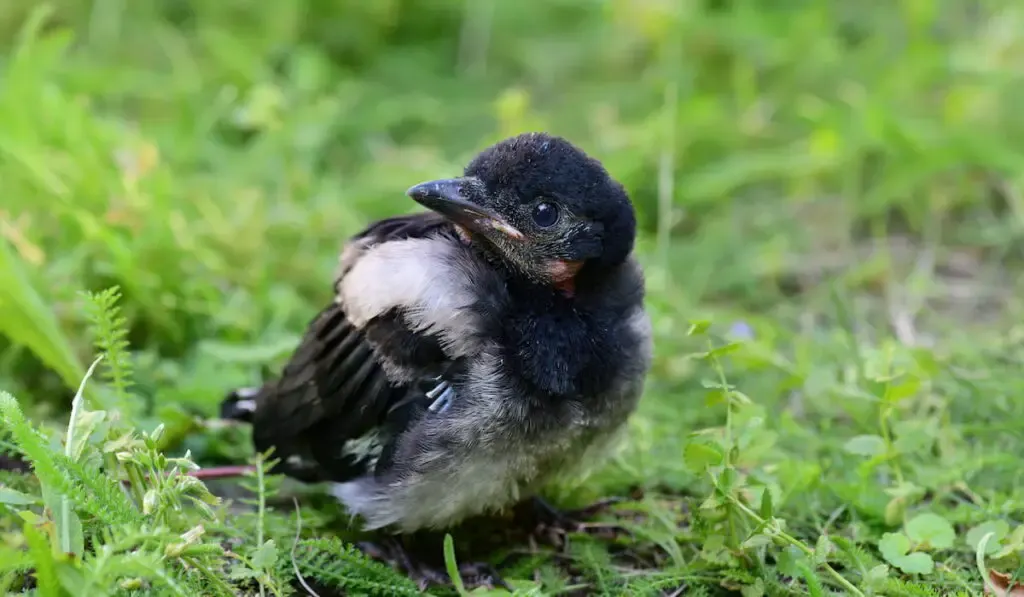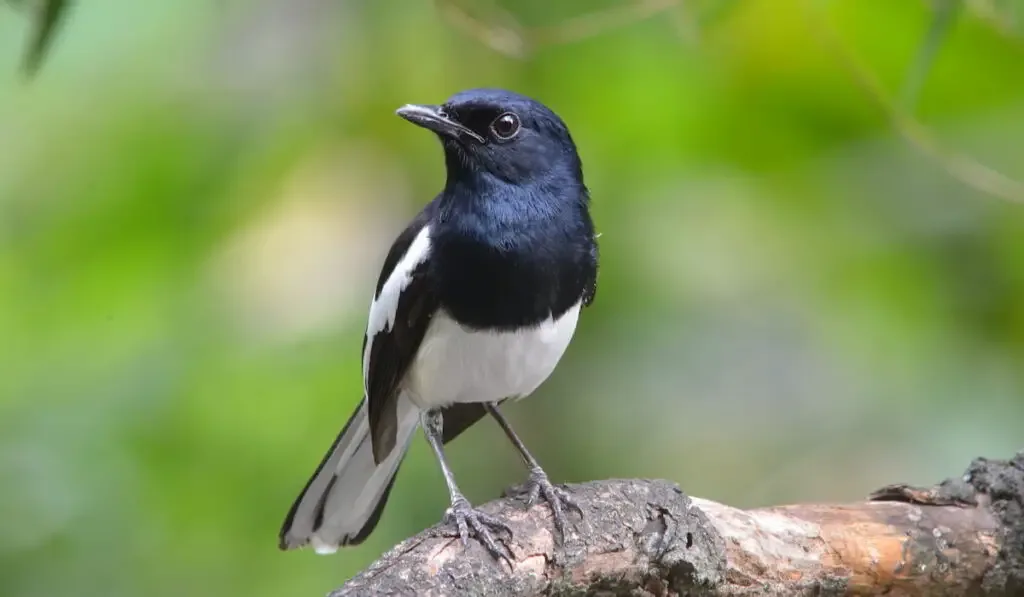If you’re wondering how to raise a baby magpie, you should first know that it’s illegal in many places. Keeping and raising wild animals is against the law in most areas, so keep that in mind given the information below.
Most people who come across a baby bird, when there is no sign of parents around anywhere, want to give it a helping hand. Baby birds are extremely fragile animals, and the wrong moves can kill them. Even if everything is done correctly, a lot of baby magpies and other birds you find outdoors don’t have good chances of survival.
Knowing that information, there are things to do to keep the magpie chick healthy enough until they can fly and survive on their own. Baby magpies are different from a lot of other common birds because they leave the nest before their feathers are fully in.
They generally forage for food on the ground before they can fly. As a result, you should be sure that there aren’t any parents around before you attempt any sort of rescue.
Here are some things you should keep in mind on how to raise a baby magpie.
Table of Contents
What to Do If You Find a Baby Magpie
The first thing you should do if you find a baby magpie is to give it some time and space. Remember, baby magpies leave the nest before they can fly.
They usually stay hidden near the foot of trees while they wait for their parents to bring them some food or forage beetles themselves.
Before you do anything, look around the area for a while and check to see whether you see any adult magpies flying around. If you do, then don’t do anything! The baby magpie is likely perfectly fine and doesn’t need any help from you.
How can you tell if the baby bird is a magpie? It can be hard to tell if it’s a small baby bird, however, you can look for things like its prominent beak and other white and black markings distinct to magpies.
Can Magpies Be Pets/ Do They Make Good Pets?
We’ve said this before, but it bears repeating. Taking a wild animal into your home is against the law in most places. It can also stress the bird to the point of death.
If you’re worried about a baby magpie, you can always call local services to come and take the bird.
As far as magpies as pets go, they are very intelligent and social birds. Some places offer magpie adoptions, so check in your area if it’s something available and go from there.

How to Care for a Baby Magpie
Here is some information on baby magpies and what they need to survive. If you adopt a magpie, this list will help you raise a happy and healthy bird.
Here’s what you need to know:
- What to feed them – Wild magpie diets will vary from domestic magpies. In the wild, these amazing birds eat a mix of insects, berries, and seeds. When they grow up, they’ll eat small rodents, frogs, and eggs from other birds away from their nests.
If you’re keeping one at home, you can feed wild bird seed, mealworms, earthworms, ground-up dog biscuits, and small pieces of lean meat. When in doubt, talk to a veterinarian about what to feed the bird.
- How to house them – Magpies are active birds that like to move around. You’ll need a large cage, at least four feet. Larger is probably better for when it grows to full size. You’ll also want to include multiple perches where the bird can sit or walk on. Of course, you’re going to need food and water as well.
- When do they fly? – Fledgling magpies typically will fly once they are around a month old. They usually stick around with their parents for several weeks to get some solid meals. Something to consider if you’re raising a magpie indoors.
- Can you release a magpie you have raised indoors? – Yes. Once the magpie is fully grown and ready to fly, you can start leaving the door open and letting the bird come and go. People report that magpies they raised would come back at night after a day spent flying around outside until they finally didn’t come back one day. Experts say that magpies will eventually get welcomed back into their community and join other birds in the wild.
5 Pet Birds That Are a Better Option Than Raising a Magpie

You may want to consider other birds as pets instead. A magpie can be a fun bird, but they have sharp talons, have a challenging diet, and there may be legal questions around keeping the bird.
Here are 5 great options you can consider instead:
1. Parakeets
Parakeets, or Budgies, are great family pets. These birds are smart, gentle, and small enough to make keeping them very convenient no matter where you live. They are people-friendly and will love spending time with you. They’re also affordable!
2. Hahn’s Macaw
If you’re up for something a bit bigger, check out a Hahn’s Macaw. These beautiful birds are the smallest of the macaw species and will give you years of fun interaction. They make a lot of noise, though, so something to know if you’re in an apartment or very close to neighbors.
3. Doves
Keeping a domesticated dove can be a great experience. You can hand feed them, and they’ll form a good bond with humans who spend time with them.
4. Cockatoo
You’ve probably seen some hilarious cockatoo videos online. These birds love to dance and are very affectionate. They need a lot of attention, so not for the crowd that’s gone all day at work.
5. Love Birds
Love birds are small and colorful and are usually better in pairs. They’re fairly social and don’t need a lot of maintenance, so they’re a great starter pet bird.
